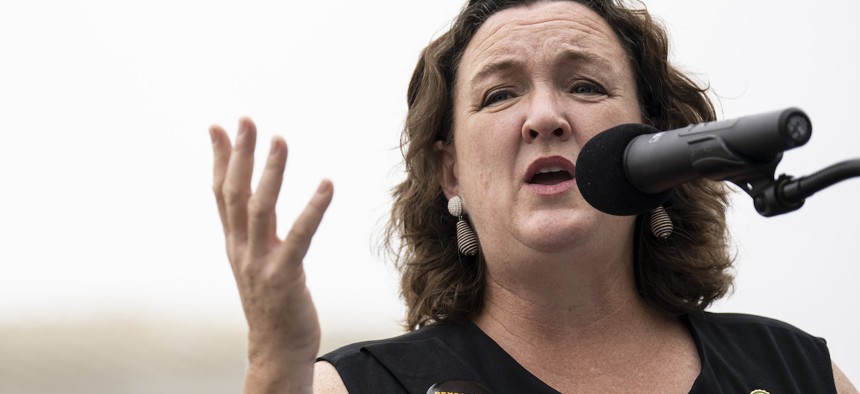
Rep. Katie Porter, D-Calif., speaks during a small rally in front of the Supreme Court on June 22, 2023. Porter said in a statement on Wednesday that the bill would hold acting officials accountable by closing loopholes that allow them to serve without congressional oversight. Drew Angerer/Getty Images
Democrats try again to reform the vacancies act
Democrats are trying once again to reform the parameters on acting federal officials.
Rep. Katie Porter, D-Calif., reintroduced a bill on Friday, co-sponsored by nine other House Democrats, that would reform the 1998 Federal Vacancies Reform Act, which governs who can serve temporarily in positions that require presidential appointment and Senate confirmation and for how long.
“Americans deserve a government that works in their best interests, not one filled with unqualified individuals beholden to special interests,” Porter said in a statement provided to Government Executive on Wednesday. “My bill would hold acting officials accountable by closing loopholes that allow them to serve without congressional oversight. I’m proud these important safeguards have the support of the top Democrats on seven major House committees.”
The Accountability for Acting Officials Act would limit the amount of time acting agency heads can serve, require acting officials to testify at least once every 60 days before Congress and prevent presidents from appointing acting officials to lead the agencies without pertinent experience.
There is one small change from the previous version of the bill, which is that they removed the provision on acting inspectors general’s qualifications, due to the reforms enacted with the fiscal 2023 National Defense Authorization Act, said Porter’s office.
The Trump administration had high levels of acting officials and vacant positions, which some lawmakers and experts said exploited the loopholes in the vacancies act. There were particularly controversial situations with temporary leadership at the Homeland Security Department and Office of the Director of National Intelligence as well as acting inspectors general at the State and Transportation departments maintaining their other Senate-confirmed positions at the agencies. Even after he left office, experts said reforms to the act are still needed, as Government Executive reported in April 2021.
During the Biden administration, the Government Accountability Office has found some acting officials to be in violation of the vacancies act, such as the acting controller in the Office of Management and Budget; acting Immigration and Customs Enforcement director; and acting general counsel for the Federal Labor Relations Authority.
An OMB spokesperson said at the time that they disagreed with GAO’s conclusion, citing an opinion from the Office of Legal Counsel from October 2022, which was issued in reference to the acting Defense Department inspector general.
“The current vacancies act needs to be amended -- to settle ambiguities that have generated litigation and to encourage the use of the traditional appointments process of nominations and confirmations,” Anne Joseph O’Connell, law professor at Stanford University and an expert in the vacancies act, told Government Executive on Wednesday. “Rep. Porter's bill does both…While I have different preferences on agency-specific succession provisions, I support this legislation.”
David Lewis, political science professor at Vanderbilt University who has written books on the presidency and presidential appointments, said, this bill “is a reasonable attempt to deal with the consequences of our broken appointments process.”
The “large number of Senate-confirmed positions coupled with political dysfunction has left a large number of positions vacant for long periods of time,” he said. “As a result, positions are regularly filled by acting officials, but the rules around the service of acting officials are lenient and contested.”







